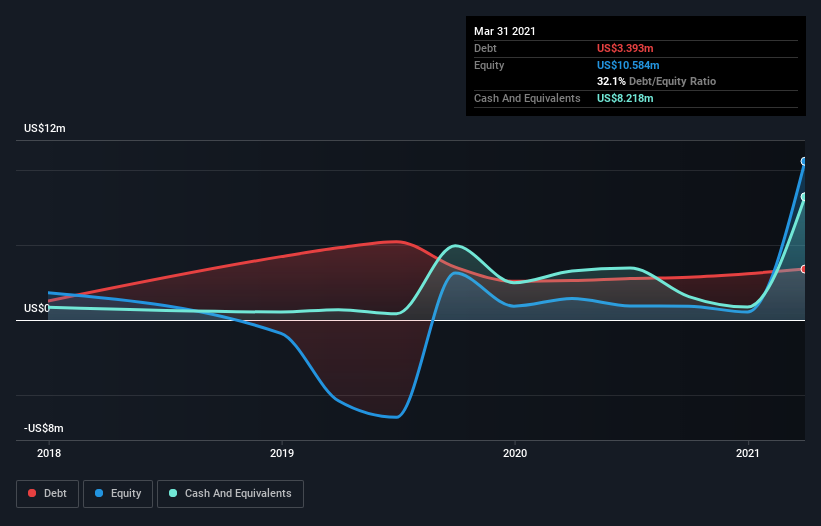Warren Buffett famously said, 'Volatility is far from synonymous with risk.' So it seems the smart money knows that debt - which is usually involved in bankruptcies - is a very important factor, when you assess how risky a company is. Importantly, XS Financial Inc. (CSE:XSF) does carry debt. But the more important question is: how much risk is that debt creating?
What Risk Does Debt Bring?
Debt and other liabilities become risky for a business when it cannot easily fulfill those obligations, either with free cash flow or by raising capital at an attractive price. In the worst case scenario, a company can go bankrupt if it cannot pay its creditors. However, a more frequent (but still costly) occurrence is where a company must issue shares at bargain-basement prices, permanently diluting shareholders, just to shore up its balance sheet. Of course, plenty of companies use debt to fund growth, without any negative consequences. When we think about a company's use of debt, we first look at cash and debt together.
See our latest analysis for XS Financial
How Much Debt Does XS Financial Carry?
The image below, which you can click on for greater detail, shows that at March 2021 XS Financial had debt of US$3.39m, up from US$2.63m in one year. But on the other hand it also has US$8.22m in cash, leading to a US$4.83m net cash position.

A Look At XS Financial's Liabilities
According to the last reported balance sheet, XS Financial had liabilities of US$3.69m due within 12 months, and liabilities of US$3.09m due beyond 12 months. On the other hand, it had cash of US$8.22m and US$2.10m worth of receivables due within a year. So it actually has US$3.53m more liquid assets than total liabilities.
This excess liquidity suggests that XS Financial is taking a careful approach to debt. Given it has easily adequate short term liquidity, we don't think it will have any issues with its lenders. Simply put, the fact that XS Financial has more cash than debt is arguably a good indication that it can manage its debt safely. When analysing debt levels, the balance sheet is the obvious place to start. But it is XS Financial's earnings that will influence how the balance sheet holds up in the future. So if you're keen to discover more about its earnings, it might be worth checking out this graph of its long term earnings trend.
Given it has no significant operating revenue at the moment, shareholders will be hoping XS Financial can make progress and gain better traction for the business, before it runs low on cash.
So How Risky Is XS Financial?
Statistically speaking companies that lose money are riskier than those that make money. And in the last year XS Financial had an earnings before interest and tax (EBIT) loss, truth be told. Indeed, in that time it burnt through US$6.1m of cash and made a loss of US$2.9m. However, it has net cash of US$4.83m, so it has a bit of time before it will need more capital. Even though its balance sheet seems sufficiently liquid, debt always makes us a little nervous if a company doesn't produce free cash flow regularly. There's no doubt that we learn most about debt from the balance sheet. But ultimately, every company can contain risks that exist outside of the balance sheet. To that end, you should learn about the 4 warning signs we've spotted with XS Financial (including 2 which are significant) .
When all is said and done, sometimes its easier to focus on companies that don't even need debt. Readers can access a list of growth stocks with zero net debt 100% free, right now.
If you're looking for stocks to buy, use the lowest-cost* platform that is rated #1 Overall by Barron’s, Interactive Brokers. Trade stocks, options, futures, forex, bonds and funds on 135 markets, all from a single integrated account. Promoted
New: AI Stock Screener & Alerts
Our new AI Stock Screener scans the market every day to uncover opportunities.
• Dividend Powerhouses (3%+ Yield)
• Undervalued Small Caps with Insider Buying
• High growth Tech and AI Companies
Or build your own from over 50 metrics.
This article by Simply Wall St is general in nature. It does not constitute a recommendation to buy or sell any stock, and does not take account of your objectives, or your financial situation. We aim to bring you long-term focused analysis driven by fundamental data. Note that our analysis may not factor in the latest price-sensitive company announcements or qualitative material. Simply Wall St has no position in any stocks mentioned.
*Interactive Brokers Rated Lowest Cost Broker by StockBrokers.com Annual Online Review 2020
Have feedback on this article? Concerned about the content? Get in touch with us directly. Alternatively, email editorial-team (at) simplywallst.com.
About CNSX:XSF
XS Financial
A specialty finance company, provides equipment leasing solutions in the United States.
Adequate balance sheet and slightly overvalued.
Market Insights
Community Narratives




